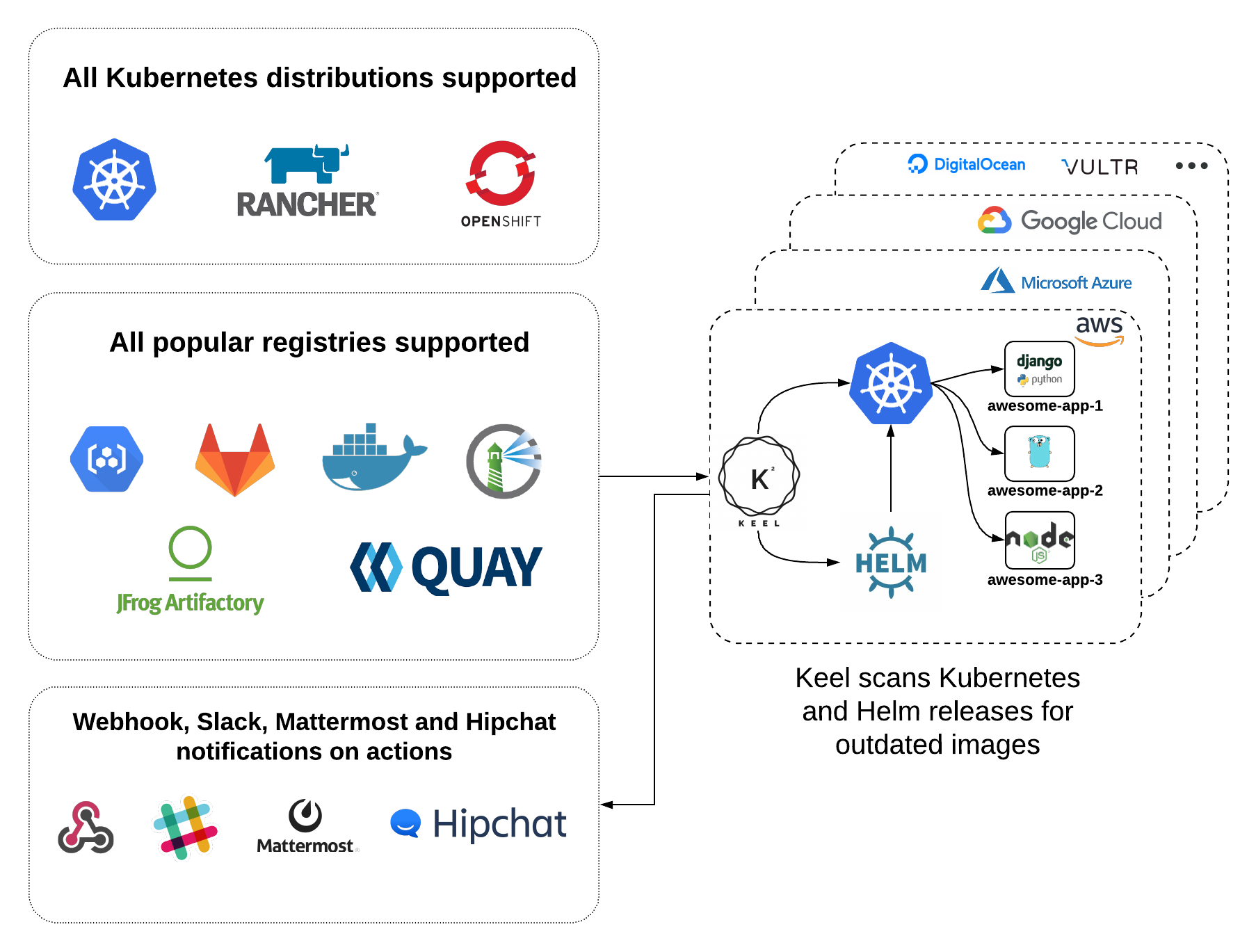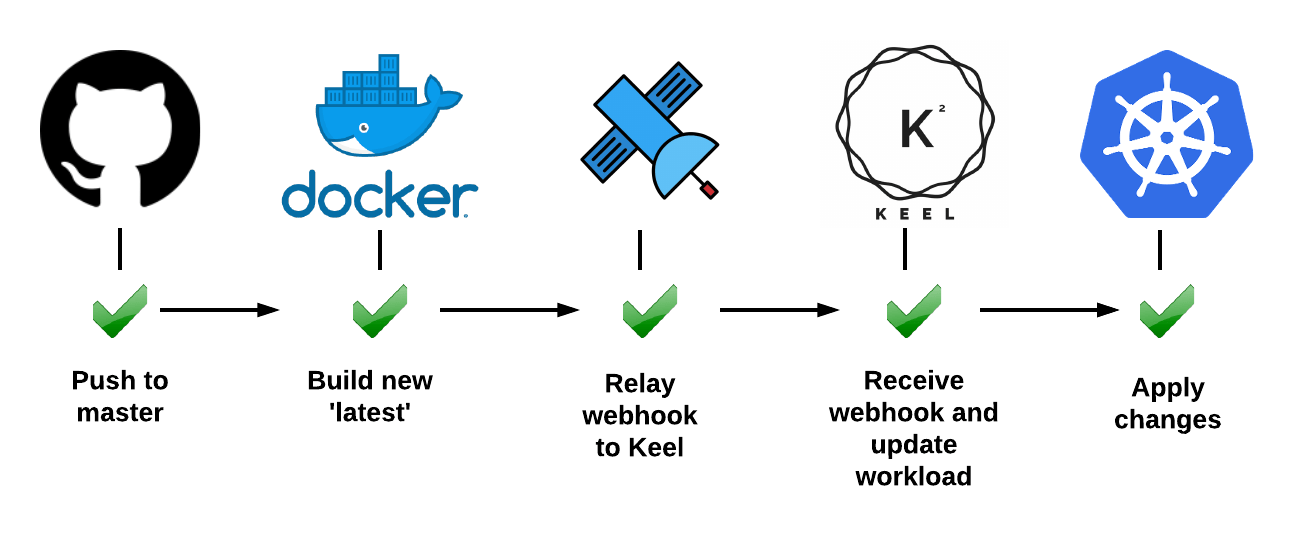- Website https://keel.sh
- Slack - kubernetes.slack.com look for channel #keel
This is a modified version of keel, providing init container support and some repairs for the GitHub Webhook endpoint. You can open a GitHub issue if it breaks but:
THE SOFTWARE IS PROVIDED “AS IS”, WITHOUT WARRANTY OF ANY KIND, EXPRESS OR IMPLIED, INCLUDING BUT NOT LIMITED TO THE WARRANTIES OF MERCHANTABILITY, FITNESS FOR A PARTICULAR PURPOSE AND NONINFRINGEMENT. IN NO EVENT SHALL THE AUTHORS OR COPYRIGHT HOLDERS BE LIABLE FOR ANY CLAIM, DAMAGES OR OTHER LIABILITY, WHETHER IN AN ACTION OF CONTRACT, TORT OR OTHERWISE, ARISING FROM, OUT OF OR IN CONNECTION WITH THE SOFTWARE OR THE USE OR OTHER DEALINGS IN THE SOFTWARE.
Keel is a tool for automating Kubernetes deployment updates. Keel is stateless, robust and lightweight.
Keel provides several key features:
-
Kubernetes and Helm providers - Keel has direct integrations with Kubernetes and Helm.
-
No CLI/API - tired of
f***ctlfor everything? Keel doesn't have one. Gets job done through labels, annotations, charts. -
Semver policies - specify update policy for each deployment/Helm release individually.
-
Automatic Google Container Registry configuration - Keel automatically sets up topic and subscriptions for your deployment images by periodically scanning your environment.
-
Native, DockerHub, Quay and Azure container registry webhooks support - once webhook is received impacted deployments will be identified and updated.
-
Polling - when webhooks and pubsub aren't available - Keel can still be useful by checking Docker Registry for new tags (if current tag is semver) or same tag SHA digest change (ie:
latest). -
Notifications - out of the box Keel has Slack, Hipchat, Mattermost and standard webhook notifications, more info here
Support Keel's development by:
- Patreon
- Paypal
- Star this repository
- Follow on Twitter
To achieve warp speed, we will be using sunstone.dev service and Minikube.
Start Minikube:
minikube startInstall customized Keel (feel free to change credentials, namespace and version tag) straight from your kubectl.
# To override default latest semver tag, add &tag=x.x.x query argument to the URL below
kubectl apply -f https://sunstone.dev/keel?namespace=default&username=admin&password=admin&tag=latest
# and get Keel IP:
minikube service --namespace default keel --url
http://192.168.99.100:3199We are overriding default latest semver tag with latest since it has the new UI. If you want to use latest semver, just remove the
&tag=latestpart from the URL.
Keel can work together with webhook relay tunnels. To deploy Keel with Webhook Relay sidecar you will need to get a token, then pre-create a tunnel and:
kubectl apply -f https://sunstone.dev/keel?namespace=default&username=admin&password=admin&relay_key=TOKEN_KEY&relay_secret=TOKEN_SECRET&relay_tunnel=TUNNEL_NAME&tag=latest
Now, you can access Keel remotely.
Prerequisites:
- Helm
- Kubernetes
You need to add this Chart repo to Helm:
helm repo add keel https://charts.keel.sh
helm repo updateInstall through Helm (with Helm provider enabled by default):
helm upgrade --install keel --namespace=kube-system keel/keelIf you work mostly with regular Kubernetes manifests, you can install Keel without Helm provider support:
helm upgrade --install keel --namespace=keel keel/keel --set helmProvider.enabled="false"To install for Helm v3, set helmProvider.version="v3" (default is "v2"):
helm install keel keel/keel --set helmProvider.version="v3"That's it, see Configuration section now.
A step-by-step guide to install Keel on your Kubernetes cluster is viewable on the Keel website:
https://keel.sh/examples/#example-1-push-to-deploy
Once Keel is deployed, you only need to specify update policy on your deployment file or Helm chart:
apiVersion: extensions/v1beta1
kind: Deployment
metadata:
name: wd
namespace: default
labels:
name: "wd"
annotations:
keel.sh/policy: minor # <-- policy name according to https://semver.org/
keel.sh/trigger: poll # <-- actively query registry, otherwise defaults to webhooks
spec:
template:
metadata:
name: wd
labels:
app: wd
spec:
containers:
- image: karolisr/webhook-demo:0.0.8
imagePullPolicy: Always
name: wd
command: ["/bin/webhook-demo"]
ports:
- containerPort: 8090No additional configuration is required. Enabling continuous delivery for your workloads has never been this easy!
Documentation is viewable on the Keel Website:
https://keel.sh/docs/#introduction
Before starting to work on some big or medium features - raise an issue here so we can coordinate our efforts.
We use pull requests, so:
- Fork this repository
- Create a branch on your local copy with a sensible name
- Push to your fork and open a pull request
If you wish to work on Keel itself, you will need Go 1.12+ installed. Make sure you put Keel into correct Gopath and go build (dependency management is done through dep).
To test Keel while developing:
- Launch a Kubernetes cluster like Minikube or Docker for Mac with Kubernetes.
- Change config to use it:
kubectl config use-context docker-for-desktop - Build Keel from
cmd/keeldirectory. - Start Keel with:
keel --no-incluster. This will use Kubeconfig from your home.
Get a test parser (makes output nice):
go get github.com/mfridman/tparseTo run unit tests:
make testPrerequisites:
- configured kubectl + kubeconfig
- a running cluster (test suite will create testing namespaces and delete them after tests)
- Go environment (will compile Keel before running)
Once prerequisites are ready:
make e2e



